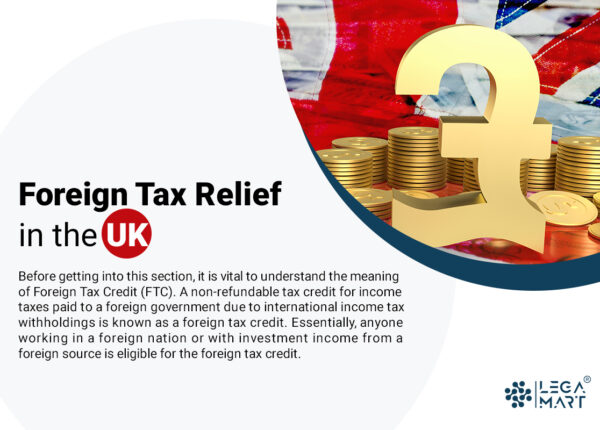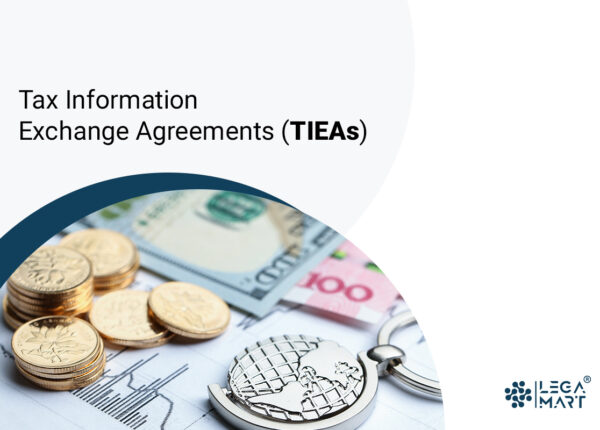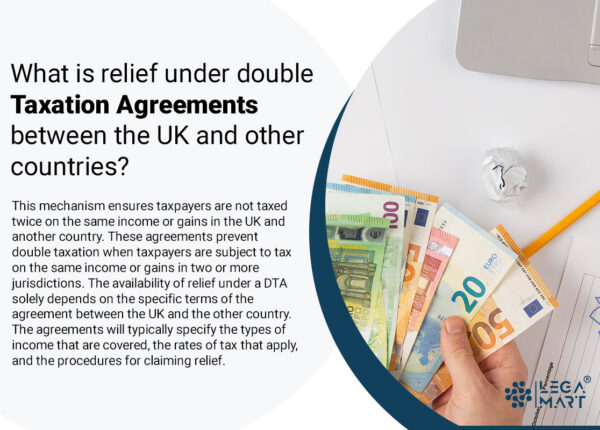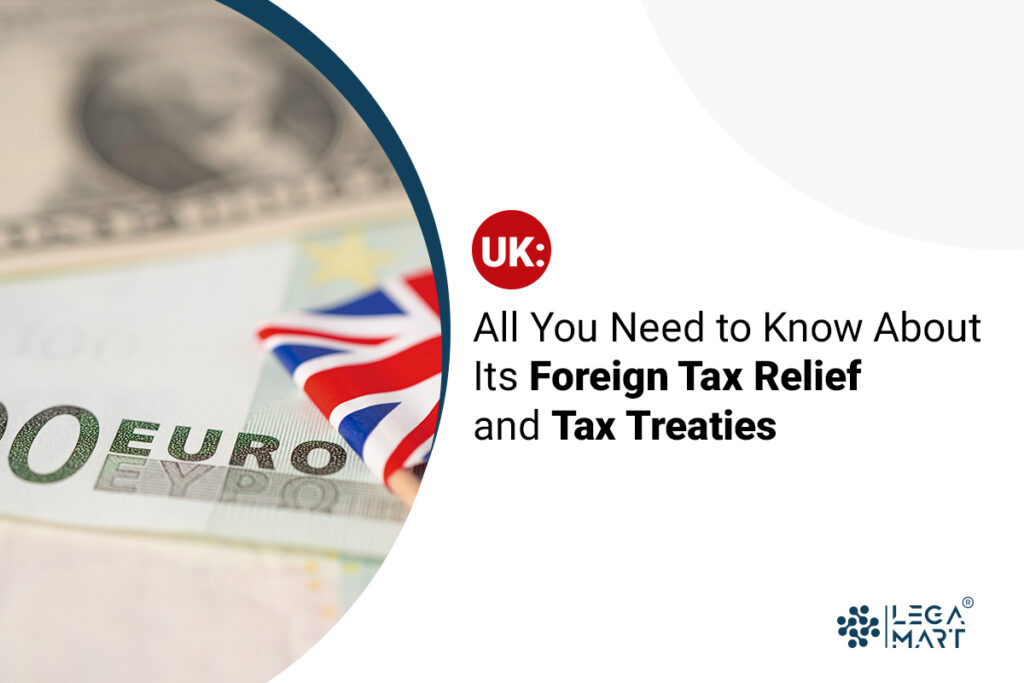Introduction
If the tax rate agreed upon in a treaty is lower than the basic UK income tax rate of 20%, then any excess tax amount above the treaty rate can be relieved through a valid claim. So, for instance, if the treaty rate is 15%, then the excess tax of 5% can be relieved if a satisfactory claim is made.
Government programs and policies to lower taxes paid by people or companies are known as tax relief.
It might be a general tax cut or a specialized program that benefits a certain set of taxpayers or helps the Government achieve a specific objective. Tax relief is often obtained by deductions, credits, or exclusions, as well as the cancellation of a tax lien on rare occasions.
For example, the various changes and adjustments to the federal tax law implemented throughout time may frequently be traced back to the US government’s policy aims. Americans are urged to save for retirement by contributing to a tax-deferred retirement savings account.
Tax penalties imposed on early withdrawals deter them from plundering those accounts. The tax code can even reveal the history of catastrophic disasters. When a hard-hit region is declared a disaster area, hurricane victims may be eligible for tax assistance to help offset the damage to private property.
Simply put, tax relief allows you to deduct certain expenditures from your gross income throughout the tax year, reducing the money you owe in taxes. You can claim tax reliefs on top of any personal tax allowances you may be entitled to, basically allowing you to keep more of your earnings and pay less tax.
How does tax relief work?
In the UK, some expenditures, such as sending a gift, repaying a debt, or contributing to a pension, can be done without taxes. Your company, for example, deducts income tax from your compensation immediately and automatically.
You can also claim tax back from HMRC (Her Majesty’s Revenue and Customs) if you’re self-employed or earn income from another source. To do so, you’ll need to complete a self-assessment tax return so that HMRC can determine how much tax relief you qualify for.
Let’s take the example of job expenses. Many people are known to spend their own money instead on things related to their job. In case the employer does not pay you back entirely, you may be able to claim tax relief.
Let’s say a person spent £100 at a tax rate of 20%. That year, the tax relief the person can claim would be £20. You must retain records of your expenditures for some claims. You must claim the money spent within four years after the end of the tax year. If your claim is for the current tax year, HMRC will normally make adjustments through your tax code. In the case of past tax years, HMRC will either make modifications through your tax code or grant you a tax refund.
Foreign tax relief in the UK

Before getting into this section, it is vital to understand the meaning of Foreign Tax Credit (FTC). A non-refundable tax credit for income taxes paid to a foreign government due to international income tax withholdings is known as a foreign tax credit. Essentially, anyone working in a foreign nation or with investment income from a foreign source is eligible for the foreign tax credit.
Individuals have lately been affected by a variety of tax measures. Most tax revisions are announced in November/December and March of each year and become law in the Finance Act in the following July.
However, given the significance of COVID-19 and its extraordinary economic impact, it is important to remember that developments may occur outside these regular timeframes.
Residents of the United Kingdom can typically claim a credit for foreign taxes paid on abroad income or gains that are taxable in the UK. This is either because of a tax treaty or UK unilateral relief. In some cases, the taxpayer can choose to have the overseas tax taken from their taxable income in the United Kingdom rather than receiving a credit for the foreign tax paid.
How to determine your foreign tax credit relief?

In order to determine the Foreign Tax Credit Relief, the individuals may use the Foreign Tax Credit Relief Working Sheets (FTCRWS). The Working Sheets are readily available on the website of HM Revenue and Customs (HMRC) for guidance of the individuals.
The first step would be to Gather information about the foreign income taxes pending or paid. Based on the gathered information, the Working Sheet has to be filled for each category of income (employment income, dividends, interest, etc.). Thereafter, appropriate deductions of the Tax Relief have to be made. The Working Sheets articulate the different tax reliefs offered by the Government. Apart from this, the benefit of the Double Taxation Treaty can be taken as may be applicable.
However, it is also advisable to take the help of a professional for proper calculations and determination of Foreign Tax Credit Relief.
How much tax credit can you claim?
Although the Tax credit claim limit depends on various factors, there are certain general principles governing the Tax Credit Limit that should be kept in mind while claiming Tax Credit.
The amount of tax credit claimed should not exceed the amount of Overseas Tax. Further, it should not surpass the maximum limit of the UK tax on the double taxation gains. Apart from the above, the calculation of the credit amount should be done separately for each income, and the excess amount of foreign tax cannot be set off on the local taxes of any other gain. Generally, the Tax Credit Claims are Due UK Tax and Foreign Taxes.
UK tax treaties
With over 100 nations, the United Kingdom has one of the biggest networks of tax treaties in the world. These agreements aim to avoid double taxation of income or profits generated in one area and paid to citizens of another.
They function by splitting each country’s tax rights under its own rules over the same income and earnings. The Model Taxation Convention of the Organization for Economic Co-operation and Development (OECD) is used in the majority of treaties.
On October 1, 2018, the OECD’s Multilateral Convention to Implement Tax Treaty-Related Measures to Prevent Base Erosion and Profit Shifting (BEPS) came into force in the United Kingdom, and it has had a significant influence on how taxpayers have utilized Double Taxation Treaties (DTTs) to which it applies.
It started to apply from January 1 2019, to the UK’s DTTs with those territories that had already been ratified before October 1 2018, if they had covered tax arrangements.
A perfect example would be the UK/Swiss agreement. HMRC and the Swiss tax authorities have entered into an agreement that allows the UK and Switzerland to work closely together, and there is a lot of information flow between the two nations.
The agreement imposes a historic charge of up to 34 percent of the amount in a Swiss account maintained by UK residents as of December 31, 2010, or December 31, 2012. However, this is no longer in effect since the UK-Swiss Disclosure Facility (UK-SDF) closed on September 30, 2023.
Instead of establishing an assessment on the receiver, Withholding Tax (WHT) is a way of collecting tax at the source from the person who makes a payment. Revenue agencies, such as HMRC, can collect tax more efficiently by withholding tax.
As per the agreement, a WHT rate of up to 48 percent on Swiss accounts was applied to UK residents holding Swiss accounts before the closure of UK-SDF. When it comes to inheritance tax, Swiss paying agents are required to withhold 40% of the tax or make a statement, among other things, when a relevant individual dies.
Tax Information Exchange Agreements (TIEAs)

TIEAs are bilateral agreements that permit countries to share tax-related information. This can resource different Governments in enforcing tax rules and preventing tax evasion. TIEAs perform on a model agreement created using the Organisation for Economic Co-operation and Development (OECD). The OECD Model of TIEA is a general agreement containing the fundamental aspects that countries should mutually agree on to efficiently exchange tax records.
Under the OECD Model of TIEAs, a wide variety of information may be transmitted in an integrated manner, which includes:
1. Taxpayer facts consisting of names, addresses, and identity numbers
2. Account information, consisting of account balances and transactions
3. Asset statistics, inclusive of possession and value
4. Income records, inclusive of salary and dividends
Apart from preventing Tax evasion in foreign jurisdictions and regulating tax avoidance, the Information Exchange also ensures that individuals and companies do not suffer double jeopardy of paying taxes in several jurisdictions. It can also indirectly help businesses to access foreign tax credits to reduce their overall tax liabilities. This would particularly help the Multinational Companies (MNCs) operating in several foreign jurisdictions.
UK Social Security Agreements
The UK has signed social security agreements with several countries around the world, including Australia, Austria, Belgium, Bermuda, Canada, Chile, Croatia, Cyprus, Czech Republic, Denmark, Estonia, Finland, France, Germany, Greece, Hungary, Iceland, Ireland, Italy and the United States of America.
Generally, individuals coming to work in the UK from a country with which the UK does not have a reciprocal social security agreement would not be eligible for UK social security benefits, and they would be required to pay UK National Insurance contributions (NICs) if they work in the UK.
However, the exception to this rule is that where individuals are assigned to work in the UK by an overseas employer, they may qualify for a 52-week exemption from paying UK NICs. This means they will not be required to pay NICs for the first 52 weeks of their assignment in the UK. This exemption is intended to provide some relief for individuals temporarily assigned to the UK by an overseas employer who do not intend to remain permanently in the UK. Equally, the exception does not apply to other UK taxes, such as the Income Tax.
However, social security agreements may help to prevent double taxation in certain circumstances, such as:-
- Providing for tax credits or other mechanisms to prevent double taxation of income; and/or
- Provide for exemptions or reductions of social security taxes in certain circumstances. For example, an individual working in the UK but covered by their home country’s social security system may be exempt from paying UK social security taxes.
What is relief under double taxation agreements between the UK and other countries?

This mechanism ensures taxpayers are not taxed twice on the same income or gains in the UK and another country. These agreements prevent double taxation when taxpayers are subject to tax on the same income or gains in two or more jurisdictions. The availability of relief under a DTA solely depends on the specific terms of the agreement between the UK and the other country. The agreements will typically specify the types of income that are covered, the rates of tax that apply, and the procedures for claiming relief.
There are two types of relief available to taxpayers under DTA which include; –
- Credit relief: Credit relief is designed to eliminate double taxation by allowing taxpayers to claim a credit for the foreign tax they have paid against the UK tax due on the same income or gains. The credit is generally limited to the amount of UK tax that is due on the same income or gains, and any excess foreign tax may be carried forward to future tax years and
- Exemption relief: This relief is designed to prevent double taxation by exempting the income or gains from UK tax where they have already been subject to tax in the foreign country. This relief is generally available for certain types of income, such as dividends, interest, and royalties.
It is crucial for you to understand the provisions of the DTA, and you may seek advice from legamart lawyers if you are unsure about your tax obligations.
Case study – US/UK tax treaty
One significant treaty of great significance to both countries is between the United States and the United Kingdom. Most nations worldwide have some income tax that citizens must pay. The United States is one of the few countries that taxes citizens rather than residents.
As a result, some ex-pats have to pay taxes twice: once in the United States and again in their home country. Pension taxation was a famous instance of this becoming a problem for many US citizens living in the UK.
The United States-United Kingdom tax treaty—officially known as the “Convention between the Government of the United States of America and the Government of the United Kingdom of Great Britain and Northern Ireland for the Avoidance of Double Taxation and the Prevention of Fiscal Evasion with respect to Taxes on Income and on Capital Gains” aims to resolve the issue of double taxation between the two nations.
There are special clauses in the tax treaty that handle individual tax problems. While there are more than a dozen clauses, the Saving Clause is the one that potentially has the most significant impact on Americans in the United Kingdom.
A Saving Clause can be found in several US tax treaties. The Saving Clause says that a government can tax its population as if the treaty didn’t exist. As a result, most treaty terms are rendered useless for Americans residing in the United Kingdom but remain in effect for UK nationals living in the United States.
This is one of the reasons you should learn about the Foreign Tax Credit (FTC) to use it to offset any British taxes you have paid if necessary. Because of the exclusions to the Saving Clause, FTC is typically possible. In most treaties, the paragraph immediately after the Saving Clause describes the clause’s exclusions.
Conclusion
It is indeed possible that your earnings and gains will be taxed in more than one nation. However, the United Kingdom has three options for guaranteeing that no one bears a double burden. The first is tax treaty relief, which can minimize or even eliminate double taxation.
Second, if no treaty exists, a person can seek ‘unilateral’ relief by deducting foreign tax from their UK tax. Finally, the individual can deduct the foreign tax from their income as an expense (known as relief by deduction), albeit this is often less efficient.
Before claiming relief for foreign taxes suffered, you should note that the individual can only claim if they have taken all reasonable steps to have their foreign liability reduced to a minimum.
Frequently Asked Questions
What is foreign tax relief in the UK?
Foreign tax relief avoids double taxation on income taxed in a foreign country, applicable to UK taxpayers. The UK allows taxpayers to claim a credit for foreign taxes paid on income taxable in the UK, reducing the amount of UK tax payable on that income.
How do tax treaties affect foreign tax relief in the UK?
Tax treaties can affect the availability and amount of foreign tax relief in the UK. The tax treaty terms between the UK and foreign countries will determine whether foreign tax relief is available. Some tax treaties may provide a tax credit, while others may provide an exemption or a deduction.
What are the advantages of tax-saving treaties?
Tax saving treaties can be helpful for individuals as well as companies. People can reduce the amount of tax they have to pay for their foreign profits or gains. Businesses can reduce the amount of tax that they have to pay on their foreign earnings.
Can tax treaties be used for tax avoidance?
Tax treaties are designed to prevent double taxation and promote legitimate cross-border economic activities. They cannot be used for abusive or artificial arrangements solely to evade tax liability, money laundering, etc.
What is the process for claiming treaty benefits?
The process for claiming treaty benefits varies from country to country basis, and the procedure specified in the treaty, if any. Taxpayers usually need to complete specific forms or provide documentation to the country’s tax authorities where the income is earned.
What if a country does not have a tax treaty with the UK?
If there is no tax treaty between the UK and the other country, the taxpayer may need to rely on unilateral tax relief provided by the UK and explore other options to mitigate double taxation.
Can tax treaties be overridden by domestic laws?
In some instances, the domestic tax laws may contain provisions that override certain aspects of International Tax Treaties. Understanding how domestic laws interact with treaty provisions is vital to assess tax liabilities accurately.




